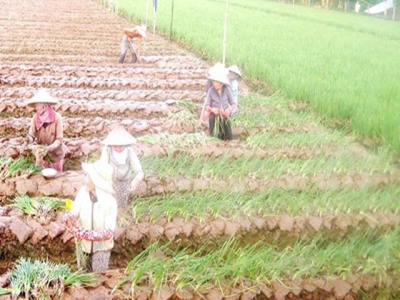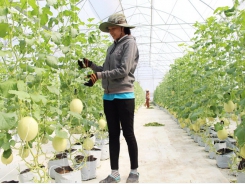Rice cultivation shows uncertainties

Farmers in provinces in the Mekong Delta are entering the harvest time of the summer-autumn rice crop; however, as the rice price is not high this year while consumption faces difficulties, farmers do not earn much. Therefore, replacing crops to increase income for farmers has become an urgent matter.
Growing vegetables is more effective than growing rice. (Photo: SGGP)
Mr. Doan Ngoc Anh, a farmer in Tan Thanh A Commune in Tan Hong District of Dong Thap Province, sadly said that after three months of hard work, his 1.7-hectare paddy field did not bring much profit. Currently, traders buy regular fresh paddy at VND4,300-VND5,300 per kilogram, depending on variety. Although the price is a little higher than in the previous month, it is still at low level. In addition, the weather is not favorable for this crop so rice productivity is poor. As a result, farmers do not have high profits
Ms. Trinh My Le, another farmer in Tan Thanh A Commune, also felt depressed as rice production became more difficult.
‘The price of rice last winter-spring rice crop was not high, merely at VND4,600-VND5,200 per kilogram, depending on rice variety so farmers earned small profits. Many households hoped that the situation would be better this summer-autumn rice crop but the price is worse,’ she said.
In An Giang Province, several farmers and even local authority also concerned about the uncertainty of paddy. The People’s Committee of An Phu District said that, there was around 13,000 hectares of summer-autumn rice in the district and farmers have harvested about 50 percent of total area. It is expected that harvesting will be finished by the beginning of August this year. Preliminary statistics of communes showed that, since the beginning of this year, after farmers paid money for materials and labor costs, there was not much money left. Meanwhile, there are lot of daily and monthly expenses. As a result, many households have had to ‘buy first, pay later’.
According to the Department of Crop Production, provinces in the Mekong Delta grew more than 1.56 hectares of rice in the summer-autumn rice crop this year, down 42,000 hectares over the same period last year. Rice productivity is estimated at 5.6 tons per hectare and production at more than 8.7 million tons, down 20,000 tons compared to last summer-autumn rice crop. Statistics by the Vietnam Food Association, rice export volume in the first six months of this year reached 3.39 million tons, down 2.8 percent over the same period last year. Rice export turnover touched US$1.46 billion, down 19 percent over the same period last year. Average export price was at $429 per ton, down 15 percent over the same period last year. Export of rice faced difficulties and low prices causing the prices of paddy to decline in tandem and farming to be not as effective as expected.
The Ministry of Agriculture and Rural Development said that it will work with the Ministry of Industry and Trade and the Vietnam Food Association to draw solutions to resolve the current situation of rice consumption in the Mekong Delta. As for the autumn-winter rice crop, the ministry puts forward two solutions. In the first solution, Mekong Delta provinces will grow 750,000 hectares of rice, up 9,380 hectares over the same period last year, with estimated production at above 4 million tons of rice, an increase of 129,000 tons. In the second one, the area of rice will be adjusted to 700,000 hectares with expected production at more than 3.8 million tons, a decrease of 137,000 tons compared to last autumn-winter rice crop.
Between these two solutions, many provinces advocated the second one because of low efficiency and high risks. Especially the lesson from the autumn-winter rice crop last year when the flood came early, submerging thousands hectares of rice, causing losses to more than 2,000 hectares in the riverhead region. The ministry said that the autumn-winter rice crop should be produced in protected areas with completely built dyke system. The latest cultivation of rice must be from August 20 to 30 so as not to affect the winter-spring rice crop.
Mr. Le Minh Thuan, vice chairman of the People’s Committee of An Phu District in An Giang Province, said that although it is forecasted that the possibility of flooding is low this year, the district warns farmers not to increase production in the autumn-winter rice crop. Last year, the district had an area of more than 7,400 hectares of autumn-winter rice. This year, the area is asked to reduce as much as possible due to low economic efficiency of rice. The district has ordered local agricultural department to give farmers technical support and help them to convert their paddy fields into land for vegetable cultivation and land for aquaculture during flood season in order to increase income for them.
In the summer-autumn rice crop, Mekong Delta provinces had converted more than 66,800 hectares of paddy fields into land for vegetable, fruit tree cultivation and aquaculture, yielding higher economic value than rice. At many places, farmers earned profits of VND80 million per hectare for growing corns, VND50 million per hectare for growing chilies, VND70 million per hectare for growing watermelons, and VND88 million per hectare for growing vegetables whereas they only earned a profit of about VND5.5 million per hectare for growing rice. Swapping crops is more effective than rice from 8 to 14.7 times. In addition, it also diversified farm produce, save water, improve soil and reduce pests and diseases.
However, it is difficult as irrigation system has not been synchronously invested. Some crops have weak competitiveness due to small scale production, difficulties in mechanization and high cost prices. In addition, policies to encourage farmers to swap crops have not been strong enough. Especially, it lacks of connection with enterprises to ensure consumption. Large-scale production has not been established so output has not been stable. These are shortcomings that need resolving for farmers to switch production effectively and sustainably.
Related news
Tools

Phối trộn thức ăn chăn nuôi

Pha dung dịch thủy canh

Định mức cho tôm ăn

Phối trộn phân bón NPK

Xác định tỷ lệ tôm sống

Chuyển đổi đơn vị phân bón

Xác định công suất sục khí

Chuyển đổi đơn vị tôm

Tính diện tích nhà kính

Tính thể tích ao



 Seeds for seedless watermelons exported to Japan
Seeds for seedless watermelons exported to Japan  Thanh An - High-tech melon planting is effective
Thanh An - High-tech melon planting is effective